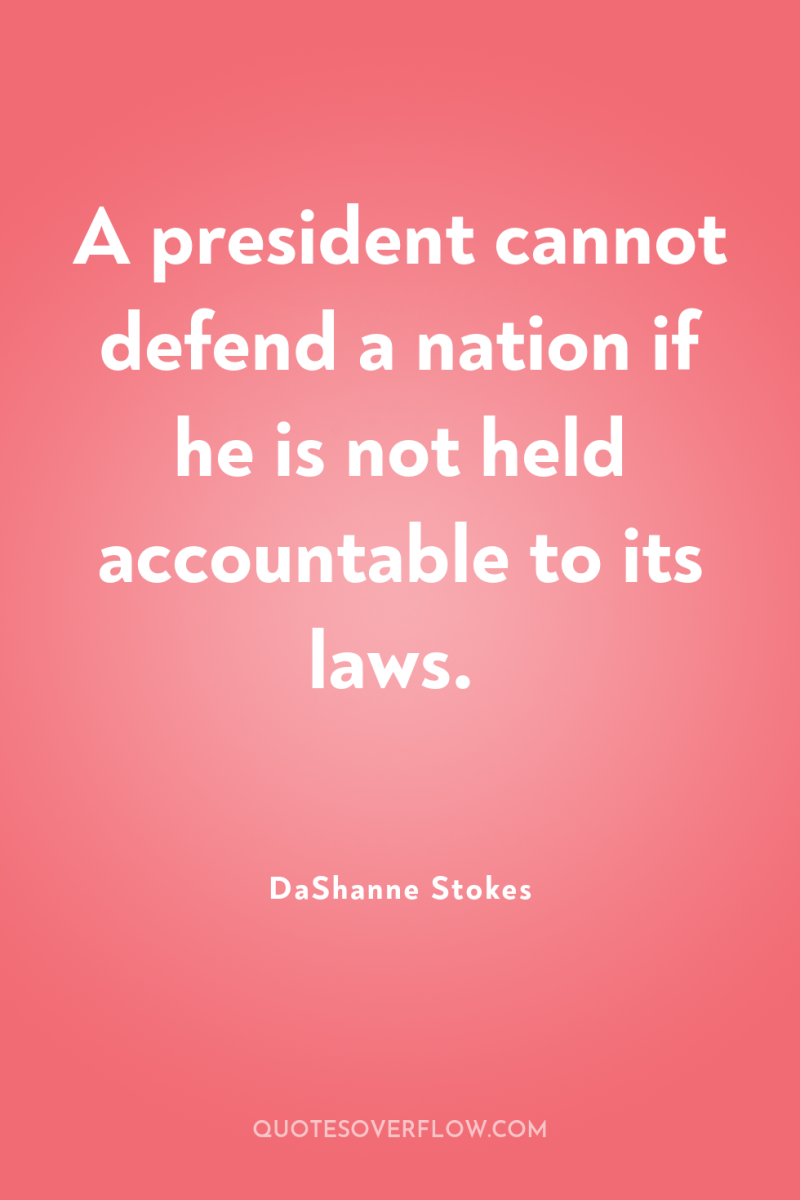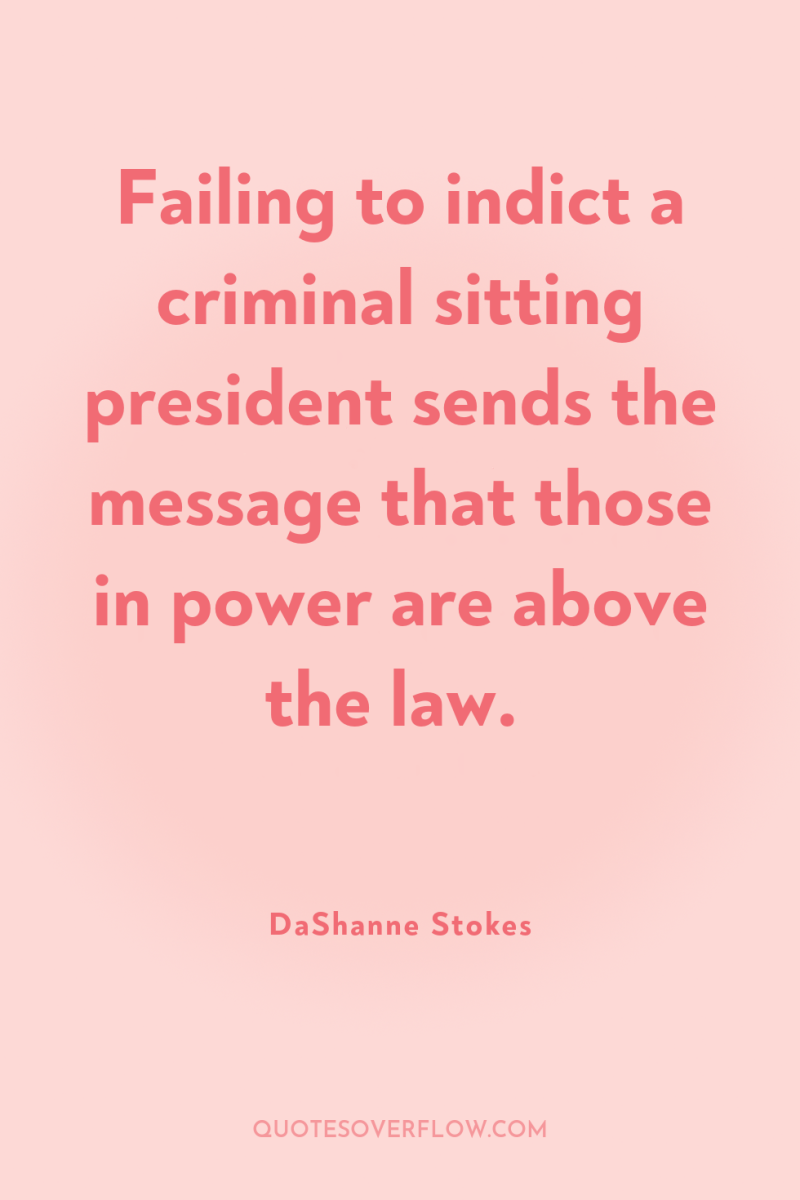
1
A president cannot defend a nation if he is not held accountable to its laws.DaShanne Stokes

2
Failing to indict a criminal sitting president sends the message that those in power are above the law.DaShanne Stokes
3
It is a shame that the Legal Aid Commission and the Aboriginal Legal Service are so poorly funded. ...... State and federal governments should be addressing this issue The Daily Telegraph, Sydney, 30 March 2014Abdullah Reslan Lawyer
4
I am convinced that imprisonment is a way of pretending to solve the problem of crime. It does nothing for the victims of crime, but perpetuates the idea of retribution, thus maintaining the endless cycle of violence in our culture. It is a cruel and useless substitute for the elimination of those conditions--poverty, unemployment, homelessness, desperation, racism, greed--which are at the root of most punished crime. The crimes of the rich and powerful go mostly unpunished. It must surely be a tribute to the resilience of the human spirit that even a small number of those men and women in the hell of the prison system survive it and hold on to their humanity.Howard Zinn
5
[Refers to 121 children taken into care in Cleveland due to suspected abuse (1987) and later returned to their parents] Sue Richardson, the child abuse consultant at the heart of the crisis, watched as cases began to unravel: “All the focus started to fall on the medical findings; other supportive evidence, mainly which we held in the social services department, started to be screened out. A situation developed where the cases either were proven or fell on the basis of medical evidence alone. Other evidence that was available to the court, very often then, never got put. We would have had statement from the child, the social workers and the child psychologist’s evidence from interviewing. We would have evidence of prior concerns, either from social workers or teachers, about the child’s behaviour or other symptoms that they might have been showing, which were completely aside from the medical findings. (Channel 4 1997) Ten years after the Cleveland crisis, Sue Richardson was adamant that evidence relating to children’s safety was not presented to the courts which subsequently returned those children to their parents: “I am saying that very clearly. In some cases, evidence was not put in the court. In other cases, agreements were made between lawyers not to put the case to the court at all, particularly as the crisis developed. Latterly, that children were sent home subject to informal agreements or agreements between lawyers. The cases never even got as far as the court. (Channel 4, 1997)”Nor is Richardson alone. Jayne Wynne, one of the Leeds paediatricians who had pioneered the use of RAD as an indicator of sexual abuse and who subsequently had detailed knowledge of many of the Cleveland children, remains concerned by the haphazard approach of the courts to their protection. I think the implication is that the children were left unprotected. The children who were being abused unfortunately returned to homes and the abuse may well have been ongoing. (Channel 4 1997) .Heather Bacon
6
[T]here are some human rights that are so deep that we can't negotiate them away. I mean people do heinous, terrible things. But there are basic human rights I believe that every human being has. The Universal Declaration of Human Rights in the United Nations says it for me. And it says there are two basic rights that can't be negotiated that government doesn't give for good behavior and doesn't take away for bad behavior. And it's the right not to be tortured and not to be killed. Because the flip side of this is that then when you say OK we're gonna turn over -- they truly have done heinous things, so now we will turn over to the government now the right to take their life. It involves other people in doing essentially the same kind of .Helen Prejean
7
Too many young Indigenous members of our community are being caught up in the criminal justice system, with an increasing number of cases resulting in notably unjust and undue outcomes, primarily due to the lack of resources availableAbdullah Reslan Lawyer
8
No more self-defeating device could be discovered than the one society has developed in dealing with the criminal. It proclaims his career in such loud and dramatic forms that both he and the community accept the judgment as a fixed description. He becomes conscious of himself as a criminal, and the community expects him to live up to his reputation, and will not credit him if he does not live up to it.Frank Tannenbaum
9
There is no one in the United States over the age of 18 who cannot be indicted for some federal crime. That is not an exaggeration.John Baker
10
The Defendant: I am pleading guilty your honors but I'm doing it because I think it would be a waste of money to have a trial over five dollars worth of crack. What I really need is a drug program because I want to turn my life around and the only reason I was doing what I was doing on the street was to support my habit. The habit has to be fed your honors as you know and I believe in working for my money. I could be out there robbing people but I'm not and I've always worked even though I am disabled. And not always at this your honors, I used to be a mail carrier back in the day but then I started using drugs and that was all I wanted to do. So I'm taking this plea to save the city of New York and the taxpayers money because I can't believe that the DA, who I can see is a very tall man, would take to trial a case involving five dollars worth of crack, especially knowing how much a trial of that nature would cost. But I still think that I should get a chance to do a drug program because I've never been given that chance in any of my cases and the money that will be spent keeping me in jail could be spent addressing my real problem which is that I like, no need, to smoke crack every day and every chance I get, and if I have to point people to somebody who's selling the stuff so I can get one dollar and eventually save up enough to buy a vial then smoke it immediately and start saving up for my next one that I'll gladly do that, and I'll do it even though I know it could land me in jail for years because the only thing that matters at that moment is getting my next vial and I am not a Homo-sapiens-sexual your honors but if I need money to buy crack I will suck. .Unknown
11
There is no greater tyranny than that which is perpetrated under the shield of the law and in the name of justice.Montesquieu